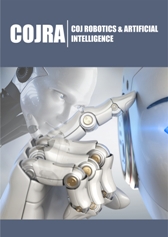- Submissions

Abstract
COJ Robotics & Artificial Intelligence
Exploring the Synergy of Chaos Theory and AI: Predictive Modeling and Understanding of Complex Systems Through Machine Learning and Deep Neural Networks Review
-
Open or CloseJavad Taghia*
Department of Mechanical and Manufacturing Engineering, Mechatronics, UNSW Sydney, Australia
*Corresponding author:Javad Taghia, UNSW Sydney, UNSW Sydney, Randwick, NSW, Australia
Submission: January 24, 2024;Published: February 08, 2024

Abstract
The integration of Chaos Theory and Artificial Intelligence (AI) presents a pioneering approach in comprehending complex systems. This mini review explores the synergy between these fields, focusing on how AI, particularly machine learning and deep learning, can elucidate the unpredictable nature of chaotic systems. Chaos Theory deals with the unpredictability and intricate patterns of systems, while AI offers innovative tools for analysis and prediction.
Traditional methods in chaos theory often fall short in predicting short-term behaviors of chaotic systems. Here, AI, especially machine learning models, demonstrates significant potential. These models adeptly analyze chaotic data sets to identify underlying trends and forecast future states. This predictive capability is crucial for managing and understanding chaotic systems in various domains.
In parameter estimation of chaotic systems, AI algorithms shine by revealing hidden patterns and relationships, especially useful in scenarios with noisy or limited data. Deep learning models, in particular, have advanced the understanding of complex systems’ dynamics. Researchers have employed deep neural networks for time series analysis of chaotic systems, enhancing our grasp of their behaviors and structure.
Despite these advancements, challenges in applying AI to chaos theory remain. Data scarcity for training deep learning models and questions around the interpretability and generalizability of AI models in chaos contexts are key concerns.
Nevertheless, the confluence of AI and chaos theory holds immense potential, with significant implications across diverse fields like finance, climate science, and healthcare. As research progresses, this collaborative approach is poised to yield profound insights and innovations, enhancing our understanding and predictive capabilities of complex systems.
Keywords:Chaos theory; Artificial intelligence; Machine learning; Deep learning, Complex systems; Predictive modeling; Time series analysis; Parameter estimation; Data analysis; System dynamics
Abbreviations:AI: Artificial Intelligence; GPT: Generative Pre-trained Transformer; LLM: Large Language Model
 a Creative Commons Attribution 4.0 International License. Based on a work at www.crimsonpublishers.com.
Best viewed in
a Creative Commons Attribution 4.0 International License. Based on a work at www.crimsonpublishers.com.
Best viewed in 







.jpg)






























 Editorial Board Registrations
Editorial Board Registrations Submit your Article
Submit your Article Refer a Friend
Refer a Friend Advertise With Us
Advertise With Us
.jpg)






.jpg)














.bmp)
.jpg)
.png)
.jpg)










.jpg)






.png)

.png)



.png)






